Recruiters need pre-employment screening to spot the best candidates quickly and accurately. It ensures they hire the right talent with the necessary skills for the job.
This blog post compares Adaface and Weirdly to help recruiters make an informed decision. You'll discover their features and why Adaface stands out in pre-employment assessments.
Explore this post with:
Table of contents
How does Adaface work?
Adaface is an intelligent skills assessment platform that helps companies automate their first round of interviews. It offers a wide range of tests across various skill domains, from programming to business aptitude.
Recruiters use Adaface to streamline their hiring process by sending customized assessments tailored to specific job descriptions. This lets them focus on candidates' actual skills rather than relying on resumes alone.
Adaface’s conversational assessments enhance the candidate experience, making it feel more like a friendly chat than a rigorous exam. This approach improves candidate engagement and completion rates.
One standout feature is Adaface's coding tests, which include scenario-based questions and real coding challenges. These tests provide a well-rounded view of a candidate’s technical competence.
How does Weirdly work?
Weirdly is a pre-employment assessment platform that focuses primarily on personality traits and culture fit. It aims to help companies understand how potential hires' personalities align with their workplace culture.
Weirdly uses its assessments to measure personality traits through a series of questions. These questions are designed to gauge how a candidate's behavior and values fit with those valued by the company, providing a tailored fit for specific organizational cultures.
One standout feature of Weirdly is its emphasis on customization. The platform allows companies to brand their assessments with logo and brand colors, enhancing candidate experience and aligning the process with company identity.
However, Weirdly lacks in offering a diverse range of tests. It does not provide tests for programming, situational judgment, aptitude, business skills, finance, cloud technologies, or AI. This makes it less versatile for roles requiring specific technical capabilities.
Adaface vs Weirdly: Test libraries
Adaface's test library offers a wide range of assessments, from coding and aptitude tests to business-specific and language proficiency exams. With scenario-based MCQs, coding questions, and customized tests per job description, Adaface aims to cater to comprehensive recruitment needs.
In contrast, Weirdly's test library has a narrower scope, focusing predominantly on personality assessments. It lacks vital components like programming and situational judgment tests, which are essential for evaluating diverse role-specific competencies.
Adaface's test library
For recruiters, using Adaface’s test library means having access to over 500 skill assessments, including tests like JavaScript Online Test, Sales Aptitude Test, and Data Science Assessment Test. Here’s a quick rundown of what you get with Adaface:
- Programming tests
- Situational Judgment tests
- Business tests
- Language tests
- Finance tests
- Cloud tests
- Job-specific tests
- Custom questions
- Ready-to-use tests
Explore the full test library.
Recruiters utilize Adaface’s test library for customized and accurate candidate assessments, ensuring they match the job requirements closely. Features such as scenario-based questions and role-specific tests make evaluation thorough and job-relevant.
To see Adaface test library in action, you can start by setting up tests for different roles like Vue.js Developer Test, Google Ads Test, and Kotlin Online Test. Customize the assessments to align with your job descriptions and streamline your hiring process.
Weirdly's test library
Weirdly's test library is primarily focused on personality assessments, offering a variety of options to evaluate candidates' soft skills and cultural fit. However, it lacks a comprehensive suite of technical and job-specific tests, which can limit a recruiter’s ability to assess candidates for specialized roles.
One of the selling points of Weirdly's library is its emphasis on personality testing, which can help organizations gauge how well candidates align with company values. This can be especially beneficial for roles where team dynamics and cultural integration are key.
Nevertheless, Weirdly's library misses out on essential technical assessments, situational judgment tests, and the ability to customize tests based on specific job requirements, leaving a gap for those looking for a more tailored evaluation approach.
Comparison of test libraries
Adaface vs Weirdly: Business, Marketing and Ops Roles
Recruiters often turn to tests to evaluate if candidates possess the specific skills they'll need on the job. By assessing real-world abilities, recruiters can identify candidates who will not only fit the role but also enhance team productivity.
Both Adaface and Weirdly provide various assessment tests, aiming to evaluate role-specific skills. However, Adaface's extensive library of over 500 tests spans multiple domains, ensuring comprehensive coverage for any job requirement.
Business, Marketing and Ops Roles with Adaface
Adaface boasts a diverse suite of functionalities for testing on-the-job skills, including:
- Over 500 ready-to-use tests
- Customizable tests tailored to job descriptions
- Evaluations that include coding challenges and situational judgment questions, making it a comprehensive assessment tool.
Recruiters favor Adaface because its tests focus on real-world applications, helping identify candidates who can thrive in their prospective roles. This is particularly beneficial for dynamic environments where adaptability and practical skills are key.
Additionally, Adaface allows for the integration of custom questions and a tailored testing approach, ensuring candidates are evaluated based on specific job requirements. This feature not only elevates the hiring process but also aligns assessments with your unique company culture.
Hiring Business, Marketing and Ops Roles with Weirdly
Weirdly offers personality tests as part of their assessment solutions for non-developer roles. Their platform focuses on evaluating character traits to provide insights into how candidates might fit within a company culture. However, this approach leans heavily on behavioral assessments rather than skills-based testing.
A key aspect of Weirdly's offering is their ready-to-use tests which can be quickly deployed by recruiters. This allows hiring managers to easily screen candidates without the need for extensive setup. While they cater to personality insights, they do not provide a range of tests for specific role-based skills in non-developer fields.
Weirdly's test library lacks diversity in terms of business, finance, and situational judgment assessments. Without aptitude or language tests, it's challenging to gauge a candidate's proficiency and adaptability for specific roles. This narrows the scope for recruiters looking to assess a comprehensive range of skills in non-developer roles.
Adaface vs Weirdly: Candidate experience and company branding
Company branding isn't just about logos and colors; it’s about making a lasting impression. When candidates interact with your pre-employment tests, they're experiencing a piece of your company’s culture and values.
It's important to ensure that assessment platforms reflect your company aesthetically and functionally. This includes everything from the ability to use your brand colors to customizing email communication templates.
Candidate experience and company branding with Adaface
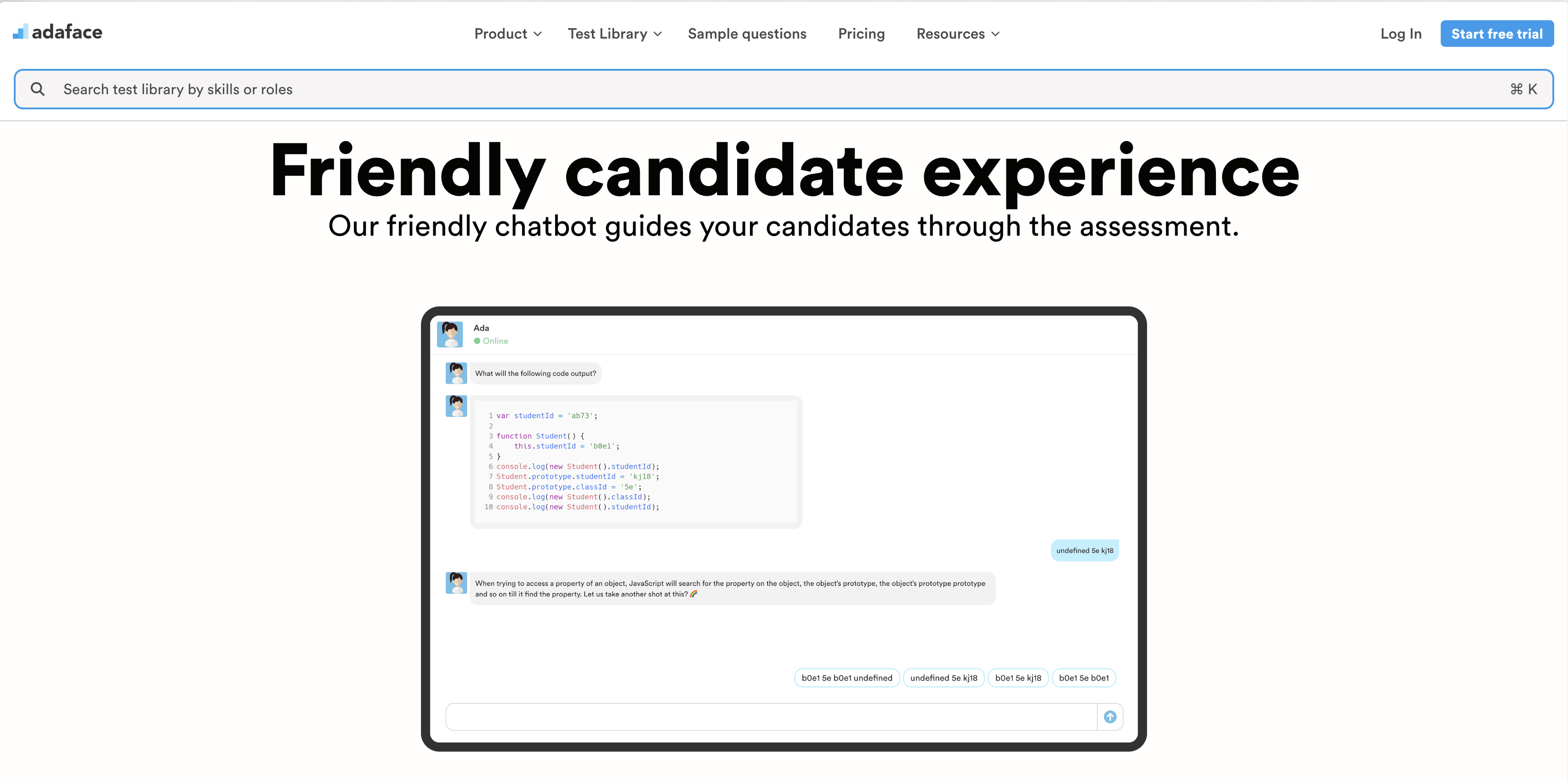
In recruitment, having a strong company brand can enhance your appeal to potential hires. Look for features that allow for custom logos, brand colors, and tailored communications that align with your company's voice and values.
Adaface allows for the inclusion of your company logo on different screens within the assessment process. This helps in creating a seamless and professional experience for the candidates from the get-go.
Customizable invitation templates are another key feature of Adaface. They ensure that your initial communication with candidates aligns with your overall branding, setting the right tone from the beginning.
Additionally, Adaface provides customizable shortlist and rejection templates. Personalizing these emails to fit your company's messaging enhances your brand perception, making every interaction with the candidate meaningful. For more insights on enhancing candidate experience, check our blog on recruitment strategies.
Candidate experience and company branding with Weirdly
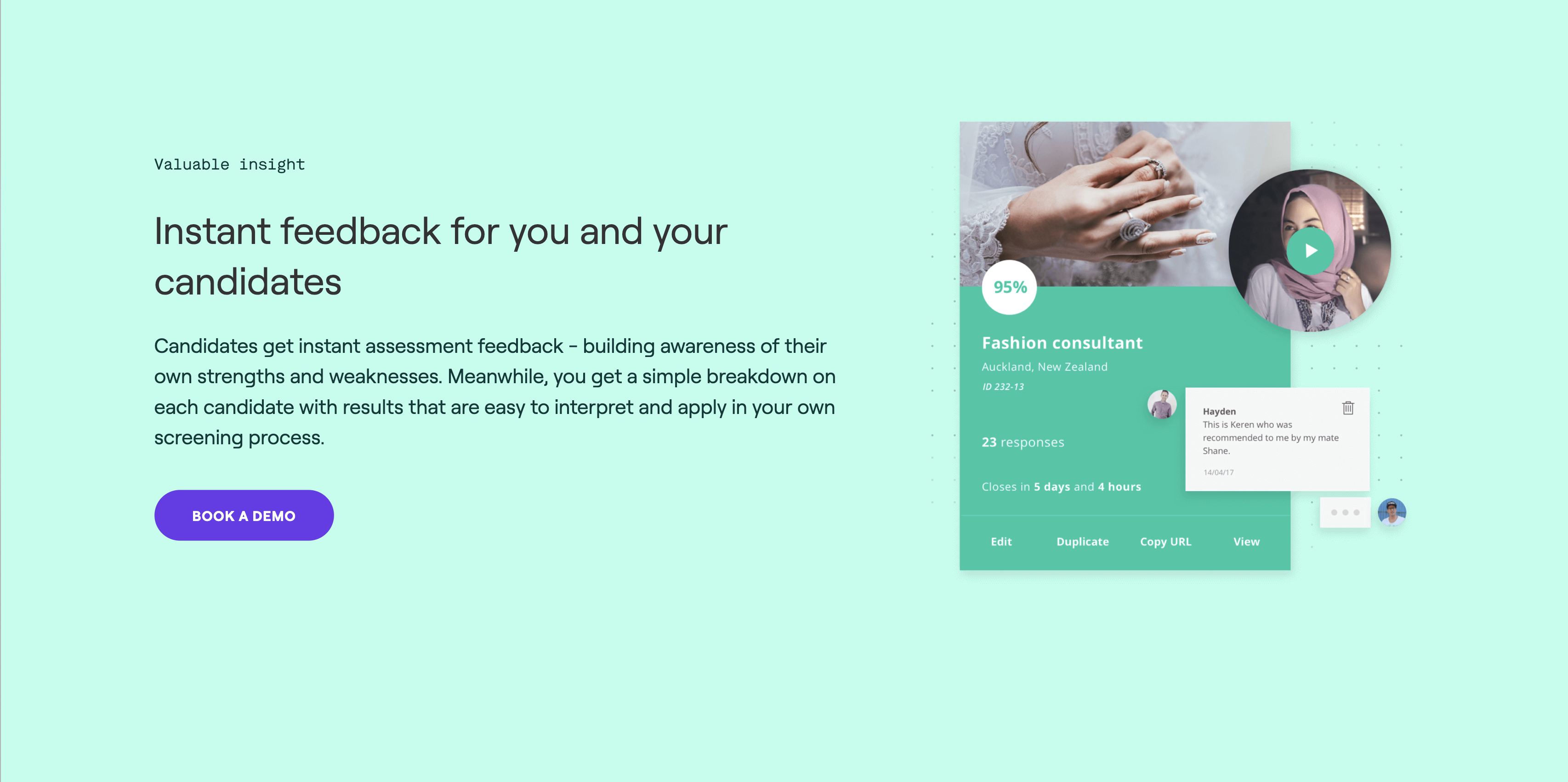
Weirdly allows companies to incorporate their logo and brand colors throughout the assessment process. This means candidates can see your company's branding from the very first screen, creating a consistent brand experience.
You can customize invitation templates to match your company's tone and style, making sure that every touchpoint with the candidate reflects your brand's messaging. This helps in creating a cohesive candidate experience.
However, Weirdly falls short in some areas of company branding. It doesn't offer customizable shortlist and rejection templates, which means you can't fully align these communications with your brand's voice and style.
Adaface vs Weirdly: Anti-cheating features
To ensure fair and accurate pre-employment assessments, anti-cheating features are a must-have for any recruitment platform. These measures help maintain the integrity of the tests, ensuring that the results truly reflect the candidates' abilities.
Anti-cheating features of Adaface
Adaface excels in providing a suite of robust anti-cheating features that ensure the integrity of your assessments. These include:
- Webcam proctoring to monitor candidates throughout the test
- IP and device fingerprint proctoring to track where the test is being taken
- Copy-paste protection to prevent sharing answers
Additionally, Adaface offers full-screen proctoring to ensure candidates don't browse for answers elsewhere, and non-googleable questions that make it difficult to cheat. With location logging and time limits on tests, recruiters can be confident in the authenticity and reliability of the results.
Adaface's detailed features also include Chat GPT protection, which logs any attempts to switch to other tools during the test. For more information on how Adaface ensures accurate assessments with its remote proctoring features, you can check out our landing page.
Anti-cheating features of Weirdly
Weirdly offers user authentication and time limits on tests, ensuring candidates are who they say they are and need to complete assessments within a set period. However, there is no clear mention of other standard proctoring features like browser or webcam monitoring on their website.
These basic anti-cheating measures provide a level of security by verifying candidate identity and timing their responses, useful for maintaining a fair testing environment.
On the downside, Weirdly's lack of detailed proctoring measures, such as location logging, IP tracking, and copy-paste protection, leaves room for potential cheating loopholes. Moreover, the absence of features like full-screen enforcement and multiple question sets can make it easier for candidates to find workarounds.
Comparison of anti-cheating features
Adaface vs Weirdly: Pricing and free trial
When it comes to pricing for assessment products, recruiters can expect a range of options that cater to different hiring needs. It's essential to find a solution that balances features with budget, and this is where Adaface starts to stand out.
Adaface pricing
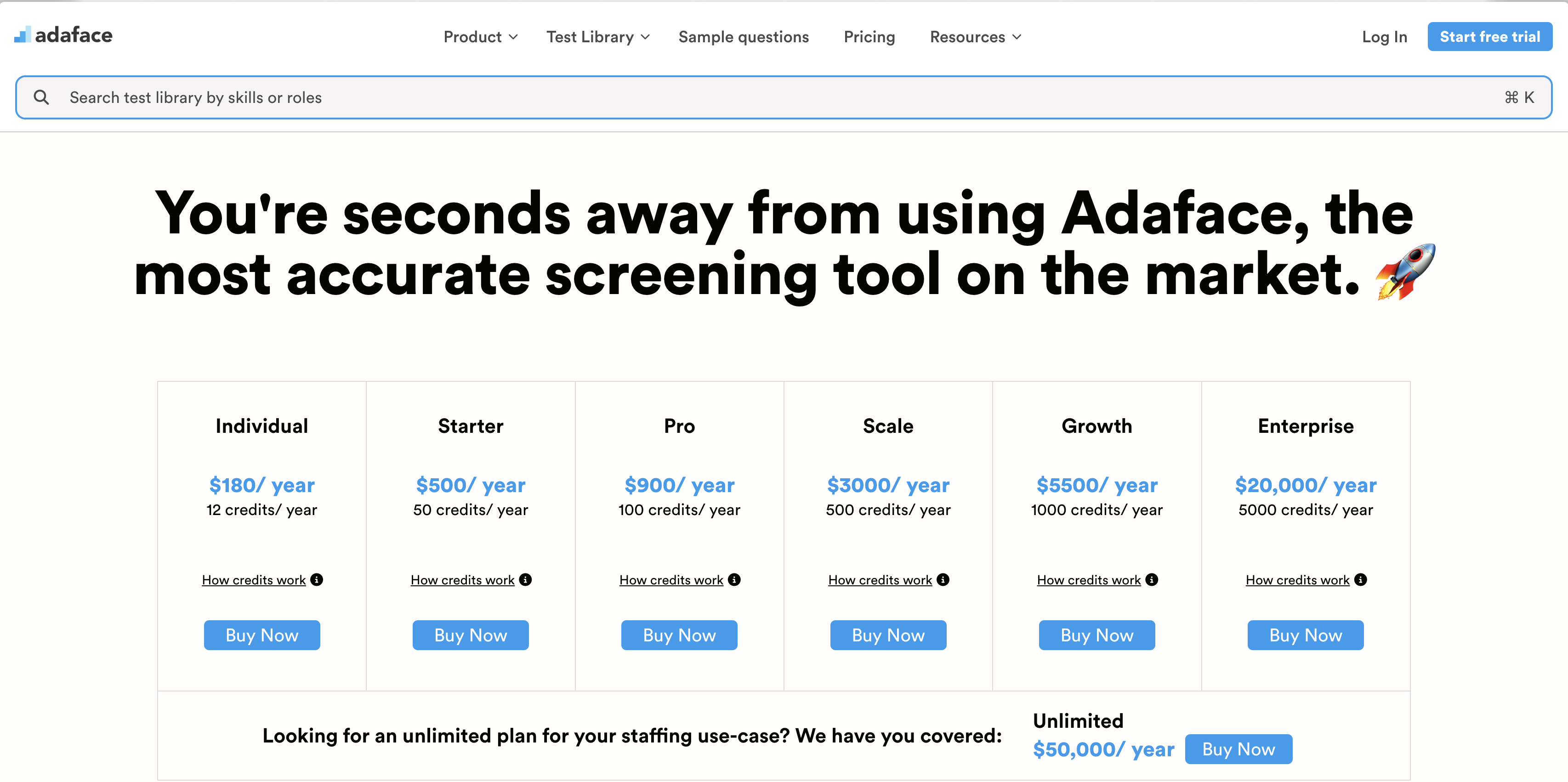
At Adaface, we offer a variety of pricing plans to suit your unique hiring requirements. We provide a free trial with two sample tests and 5 credits so you can explore all features before making a purchase decision. Our plans start with the Individual Plan at just $180, perfect for those who want to dip their toes into skill assessments without a hefty commitment. For teams, our Starter Plan kicks off at $500 for 50 credits, making it a great choice for small to medium-sized companies.
As your hiring needs grow, consider our Scale Plan for $3000, providing 500 credits, or the Growth Plan at $5500 for 1000 credits. We also offer an Enterprise Plan at $20000 for 400 credits, ideal for larger organizations that have significant hiring volumes. Plus, our Unlimited Plan at $50000 per year allows for all-you-can-eat assessments, ensuring you never have to worry about running out of credits.
With our transparent pricing structure, companies can easily choose a plan that fits their budget without the hassle of hidden fees or lengthy negotiations. To explore all our options, check out our Adaface Pricing page for more details!
Weirdly pricing
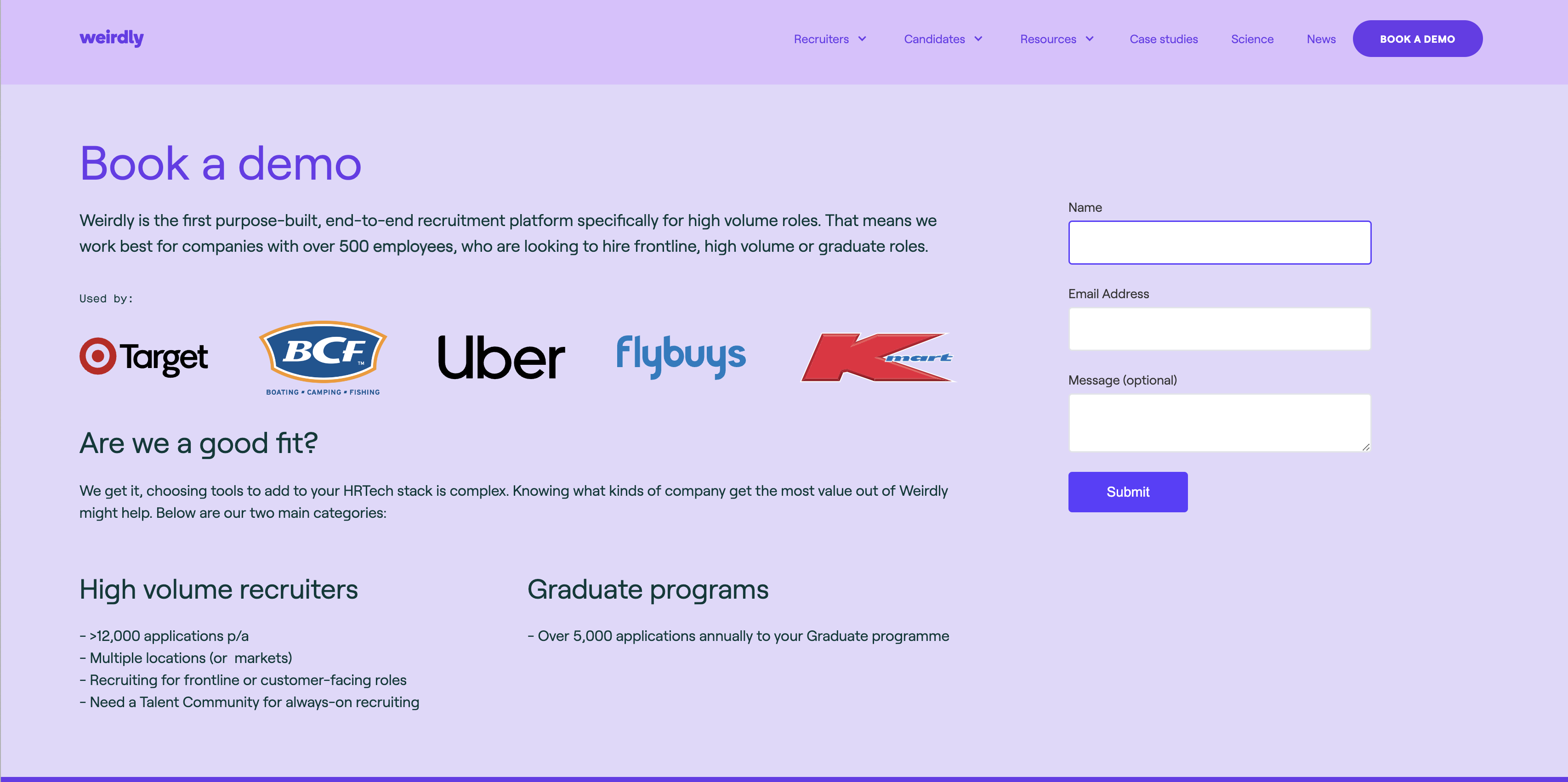
Weirdly does not publicly disclose specific pricing details on their website, making it necessary for potential customers to reach out directly for a quote. Unlike many platforms that offer clear and detailed pricing plans, Weirdly requires a conversation with their sales team to obtain this information. This approach can be less transparent and time-consuming for recruiters who prefer to compare options online before engaging in further discussions.
One notable gap in Weirdly's pricing structure is the absence of a free trial, which could allow recruiters to explore the platform's features before committing financially. Additionally, the lack of easy signup options and the ability to explore all features upfront may leave recruiters uncertain about the platform's capabilities. For businesses looking to evaluate multiple tools efficiently, these missing elements can be a significant drawback.
Comparison of pricing
Adaface vs Weirdly: Scorecards, reporting and analytics
Analytics tools are the backbone of a data-driven hiring process, enabling recruiters to evaluate and compare candidates thoroughly. Ideal platforms should offer detailed, shareable reports that make it easy to interpret test results and make informed decisions.
Adaface scorecards, reporting and analytics
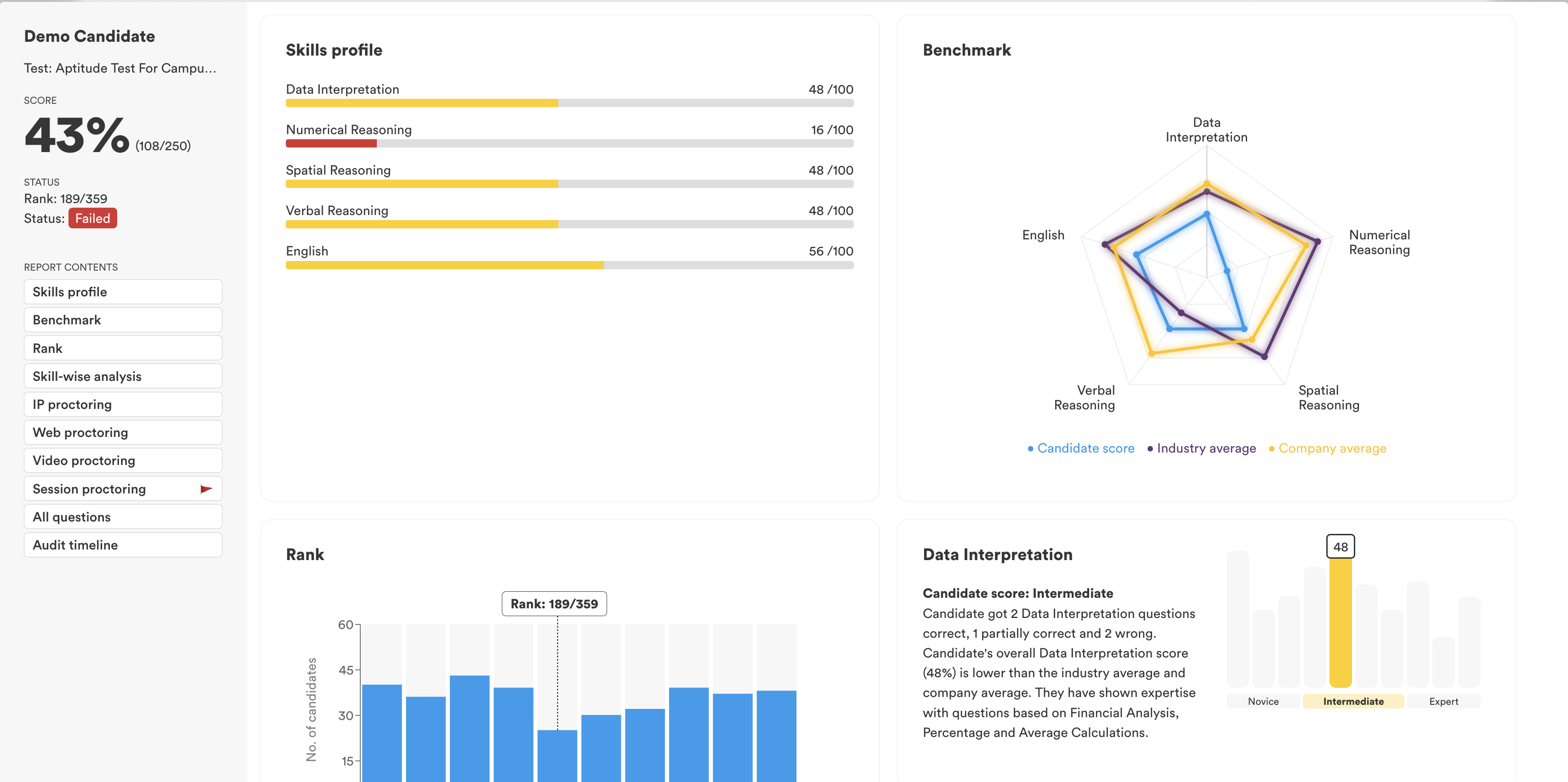
Adaface offers detailed scorecards that provide a clear, concise overview of each candidate's performance. These scorecards are automatically generated in real-time and include comprehensive information about various skills, making them indispensable for the hiring team.
Recruiters can download these reports in PDF, Excel, and CSV formats, ensuring easy sharing and internal evaluation. Adaface also enables public report sharing, allowing external stakeholders to access scorecards without logging in.
A standout feature is Adaface's skills profile, which breaks down candidate performance across multiple skills, including a radar chart for quick analysis. Additionally, the tool includes an audit timeline with detailed proctoring logs, offering transparency and trust in the assessment process.
Weirdly scorecards, reporting and analytics
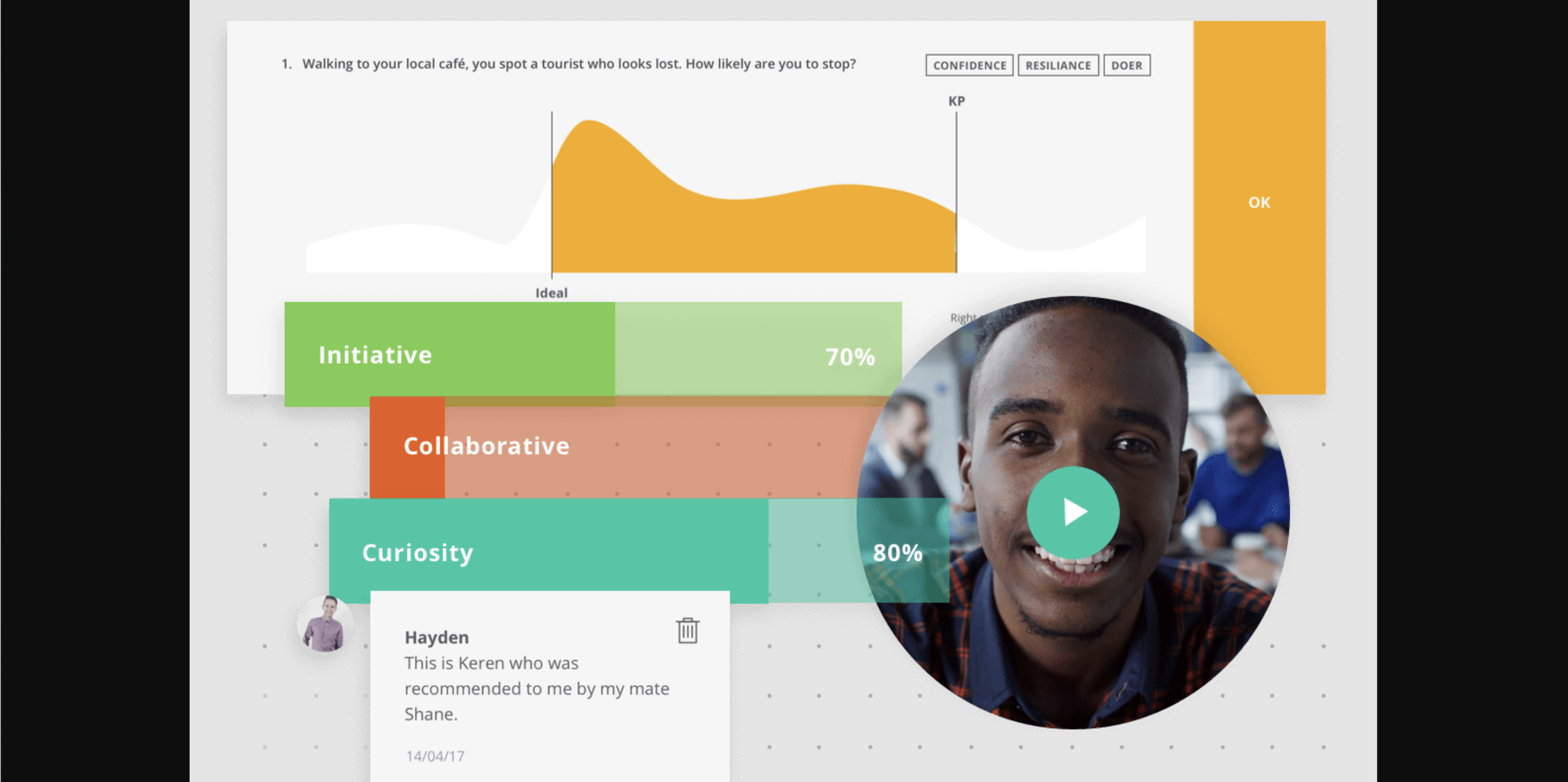
Weirdly's reporting features offer a basic overview with skills profiles focused primarily on personality traits. They provide benchmarking capabilities, allowing recruiters to see how candidates stack up against each other, which can be handy for spotting top performers in a crowded applicant pool.
However, while Weirdly generates scorecards post-assessment, they seem to lack options for exporting reports in commonly used formats like PDF, Excel, or CSV. Imagine needing to share results with your hiring team, but finding yourself limited to just internal views on the dashboard.
Additionally, Weirdly doesn't seem to offer an audit timeline, which can be a bit of a bummer if you're looking for detailed proctoring logs. This means recruiters might miss out on some crucial insights during their candidate assessments.
Comparison of scorecards, reporting and analytics
Adaface vs Weirdly: Enterprise and startup friendliness
For a product to be friendly to both enterprises and startups, it needs to offer flexibility, scalability, and compliance with key regulations. Features like ATS integration, role-based access, and support for custom data locations can make a significant difference in managing diverse hiring needs.
Adaface's enterprise and startup friendliness
Adaface shines with its ATS integrations, allowing seamless workflow integration for enterprises. This ensures your recruitment process is efficient and smooth, without having to juggle multiple platforms.
On the startup front, Adaface offers unlimited team seats in all plans, making it cost-effective and scalable as your team grows. Startups can also benefit from multiple invite options, ensuring flexibility in sending out assessments.
For enterprises, priority support and custom API access are key features that enhance the user experience. With the ability to support custom data locations, Adaface ensures compliance with local data regulations, making it a versatile choice for global companies.
Weirdly's enterprise and startup friendliness
Weirdly offers a range of features tailored for both enterprises and startups, including ATS integrations and GDPR compliance, making it a reasonably attractive option for organizations looking to streamline their hiring process.
The ability to integrate with ATS systems means that companies can smoothly incorporate assessments into their existing workflows, which is great for scaling hiring efforts without disrupting operations.
However, Weirdly lacks multiple question sets and a custom API, which can limit flexibility and adaptability for companies that want to customize assessments or track candidates more effectively.
Comparison of enterprise and startup friendliness
Adaface vs Weirdly: Assessment quality control
Quality control in assessments ensures that the tests are reliable and produce accurate results. This is critical for recruiters as it helps them make informed hiring decisions.
Adaface's quality control features
Adaface takes quality control seriously with several robust measures in place. Each question undergoes rigorous quality checks before going live to ensure it effectively assesses candidate skills.
Our platform employs proprietary algorithms to continuously evaluate and improve the quality of questions. This helps maintain a high standard across our test library.
We also actively seek and incorporate both candidate and customer feedback to refine and enhance our assessments. This ensures that our tests remain relevant and effective.
To ensure the integrity of our questions, Adaface engages in social listening to detect and remove leaked questions from active tests. This keeps our assessments fair and accurate.
We replace questions that have been used extensively to prevent overexposure and maintain test reliability. This way, candidates are always evaluated on fresh and pertinent material.
For a deeper dive into how we design our questions, check out our how we design questions page.
Weirdly's quality control features
Weirdly has a quality control process that includes checks before questions go live to ensure they are suitable for assessing candidates' skills. However, there’s little information on how they gather or utilize candidate and customer feedback to refine their tests.
While Weirdly focuses on quality checks prior to question deployment, it lacks mechanisms like social listening to monitor question leaks or public availability, which can undermine test integrity. This oversight may lead to candidates encountering familiar questions, reducing the assessment's effectiveness.
Furthermore, there’s no evidence of proprietary algorithms at Weirdly that analyze question performance or quality over time. This absence could result in a static test library, lacking the dynamism needed to adapt and improve based on real-world usage.
Comparison of quality control
Adaface vs Weirdly: Conclusion
Adaface and Weirdly both offer convenient pre-employment screening solutions.
Even considering these similarities, Adaface excels with better customization options and broader test coverage.
Weirdly lacks some key assessments like coding tests, situational judgment tests, and AI tests.
Streamline hiring with skill tests
Adaface provides these vital assessments, which can be tailored to specific job descriptions and roles, ensuring an accurate match.
Pre-employment assessments help recruiters evaluate candidates' job-specific skills, cognitive abilities, and personality traits.
Recruiters can save time and reduce bias while getting a detailed insight into each candidate's capabilities.
Adaface is the solution for modern recruiting needs. Explore our platform or sign up for a free trial today to experience it yourself!
Adaface vs Weirdly FAQs
Adaface offers a wider range of test types, including coding, AI, and aptitude tests, while Weirdly primarily focuses on personality assessments.
Yes, Adaface allows users to create custom questions and tests tailored to specific job roles and requirements.
It's unclear if Weirdly supports adding custom questions as this feature is not prominently mentioned.
Adaface has extensive proctoring capabilities including web and webcam proctoring, whereas Weirdly does not mention these features.
Yes, both Adaface and Weirdly offer ATS integrations to streamline the hiring process.
Adaface offers a free trial, allowing recruiters to explore its features. Weirdly does not mention a free trial.

40 min skill tests.
No trick questions.
Accurate shortlisting.
We make it easy for you to find the best candidates in your pipeline with a 40 min skills test.
Try for freeRelated posts



